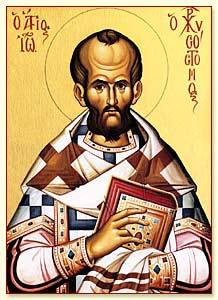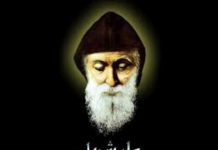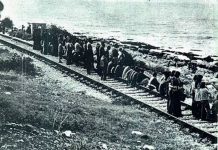Saint John Chrysostom, the Golden Mouth
تذكار يوحنا فم الذهب/13 تشرين الثاني
نقلاً عن موقع قديس اليوم Saint of the day
وُلِد يوحنّا في مدينة انطاكية ونشأ في أسرةٍ وثنيّة شريفة. كان أبوه قائدًا في الجيش الرومانيّ، وأمَّه أنثوسا قد ترملت وهي في ريعان الصِّبا. وكانت قد تنصَّرت فعنيت بتربية طفلها ووحيدها، تربية عالية. فتعمّق في درس فلسفة الإنجيل وتعاليمه السّامية. رسمه البطريرك ملاتيوس شمّاسًا إنجليًّا.
وبعد وفاة والدته، هجر العالم واعتزل للصّلاة والتأمل والشغل اليدويّ، وتأليف الكتب العديدة، إلى أن استدعاه البطريرك فلافيانوس، ورسمه كاهنًا وسلَّمه منبر الوعظ في الكنيسة. فاندفع يعظ ببلاغة عجيبة حتى أدهش السّامعين فلُقَّب “بالذهبيّ الفم”. وكانت مواعظه مشبَّعة بروح الحكمة الإلهيّة وشرح الكتب المقدّسة، ولاسيّما رسائل مار بولس.
وعلى أثر وفاة بطريرك القسطنطينيّة أجمع البلاط الملكيّ والشّعب على انتخابه بطريركًا. فاستقبلته القسطنطينيّة بأبهى مظاهر الحفاوة. وكان يُعنى بالطقوس والترانيم البيعيّة، وإليه ينسب النّافور المعروف باسمه وتستعمله الكنيسة الشرقيّة.
وقد خصَّ الفقراء، بعنايته الأبويّة: فأنشأ لهم الملاجئ والمياتم من أموال الوقف وممَّا يوفَّره باقتصاده وعيشته الفقرية. ولم ينفكّ عن الوعظ والتأليف، ومكافحة البدعة الأريوسية. ولم يكن يهاب أحدًا في إحقاق الحقّ ونُصرة المظلوم. ولمّا اغتصبت الملكة أفدوكيا كرمًا لأرملة، منعها من دخول الكنيسة فغضبت وتآمرت هي وتاوافليوس بطريرك الإسكندريّة، خصم يوحنّا، على تنفيذ مآربها. فعقد هذا مع بعض الأساقفة مجمعًا وقرَّروا عزل يوحنّا عن كرسيه وإبعاده عن البلاد.
ولمَّا علم الشّعب بذلك الحكم الجائر، هجم على القصر وكاد يفتك بمن فيه، وحدثت زلزلةٌ فخافت الملكة وقامت تكتب إلى البطريرك القدّيس، ترجوه بالدّموع، أن يعود إلى كرسيه، وتعتذر عمّا جرى بحقّه. فعاد بين أهازيج الشعب، وهدأت الزوبعة.
ولمَّا نُصب تمثال الملكة في ساحة الكنيسة، أخذ الرعاع يقيمون حوله ألعابًا مخلّة بالآداب، انهال عليهم بالتقريع الشديد ومنعهم عن مثل تلك الألعاب. فاستشاطت أفدوكيا غيظًا، واستصدرت أمرًا من الملك، بابعاد القدّيس ثانية. وكان الجند يُذيقونه من الإهانات والعذابات ألوانًا، وهو صابر. وقد خارت قواه، وشعر بدنو أجله.
وفي اليوم التالي 14 أيلول، عيد الصّليب، لفظ هذه الكلمات: “ليكن الله ممجَّدًا في كلّ شيء”. وأسلم الرّوح سنة 407.
وله تآليف قيّمة كثيرة ومواعظ خالدة ورسائل عديدة، منها رسالته من منفاه إلى القدّيس مارون النّاسك وهي تفيض بعواطف محبّته وولائه. صلاته معنا. آمين.
Saint John Chrysostom, the Golden Mouth
Did you know that “Chrysostom” is a nickname that means “golden-mouthed”? A legendary orator, St. John Chrysostom enjoyed immense popularity as a preacher in Antioch. Many of the texts of his sermons, which skillfully blend incisive scholarship with practical instruction, are available today and are considered some of the best examples of the theological thought of his era.
Despite fierce cultural opposition, John was unafraid to criticize the evils of his society and government, no matter what the cost. As we celebrate the Feast of St. John Chrysostom on September 13, we reflect on his life and legacy, inspired by his unflinching boldness in proclaiming the truth.
Early Life
John was born in 347 in Antioch, Syria. The son of an army officer, he was primarily raised by his mother, as his father died when he was very young. When John converted to Christianity at age 23, he decided to live with the monks in the mountains on the outskirts of Antioch. For a few years, he cloistered himself in a damp cave – to his own detriment. After suffering poor health from his living conditions, John returned to the city, and in 397 became bishop of Constantinople.
St. John Chrysostom east façade
St. John Chrysostom portrayed in the east façade
John’s Bold Speech
Many of John’s sermons criticized the sensuous and lavish lifestyles led by the wealthy while the poor languished in the slums. At that time, Eudoxia, the empress, was notorious for her extravagant, superficial lifestyle. Some of the aristocratic practices surrounding modesty were not only dehumanizing to servants and slaves, but very often led to the exploitation of the lower classes. John’s fearless excoriation of these customs led people to accuse him of specifically criticizing the empress, and years later, after being tried for that “crime,” he was banished to a remote town on the Black Sea.
Unfortunately, he was forced to make the journey on foot in the middle of a blazing summer, pushed onward at an impossible pace by inhumane guards. Just a few months later, he was carried to a nearby chapel at the point of exhaustion and died with the words “Glory be to God for all things,” on his lips.
St. John Chrysostom is portrayed in the Basilica in the east Façade, the Baldachin, and in the east apse lunette window of the St. Susanna of Rome Chapel in the Crypt Church.


















